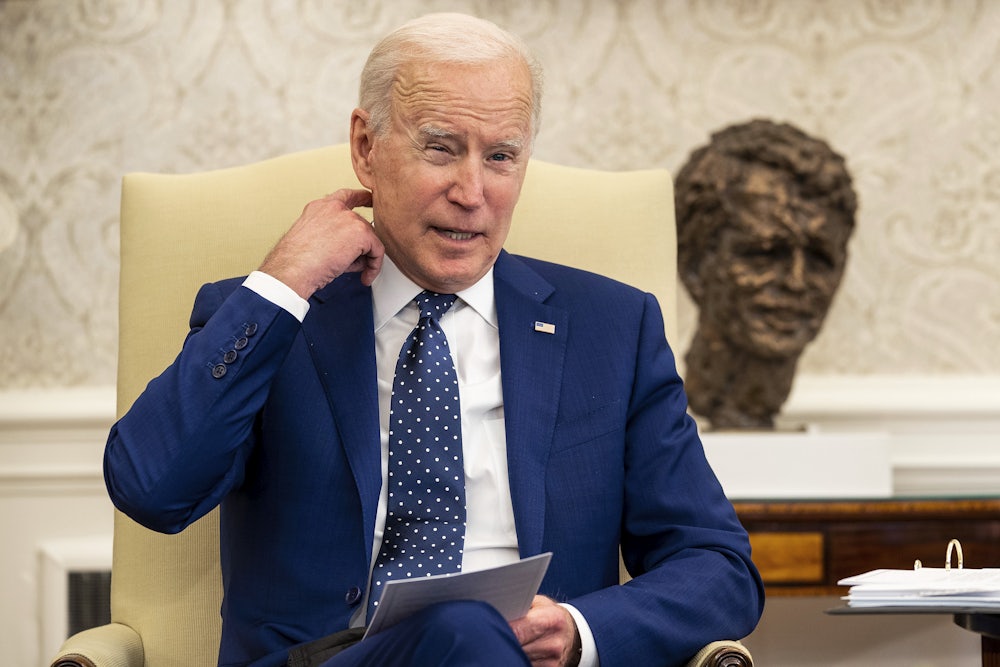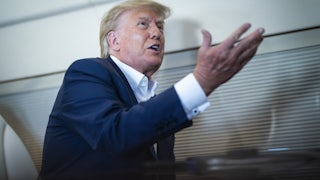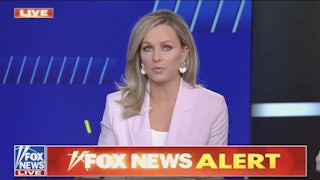The Donald Trump indictment (and, yes, there is something uplifting about those words) is one of those moments in politics when almost all public words are soporifically predictable but private thoughts are potentially fascinating. So to avoid the necessity of waiting for the White House memoirs to get the good stuff, here is a serious attempt to imagine what Joe Biden and his closest aides were saying and thinking on Thursday night.
The cliché of the moment around the Oval Office, repeated so often that it merited its own emoji, was, “When your opponent is committing suicide, don’t get in the way.” The president sat at his desk, with a small smile at the corners of the mouth, while nearly a dozen senior aides gamed out the implications of the indictment.
Before they even gathered, instructions were telephoned to White House staffers (to avoid even the hint of a paper trail) with a dire warning: Anyone, even the most junior policy aide, would be fired if he or she were caught gloating or joking in any way about Trump. That dictum especially applied to late-night drinks with friends and emails to family members. And every press comment—even whispered off-the-record chats with trusted reporters—had to be limited to variants of “We have faith in the American legal system, and we will have nothing further to say about any legal matter that is not under federal jurisdiction.”
Within the Oval Office, there was a vigorous internal debate over whether it was good for the president that the initial Trump prosecution came from Alvin Bragg, the left-wing Manhattan district attorney with no close Biden connections. Trump had immediately charged Thursday night that Bragg was “doing Joe Biden’s dirty work.” But this seemed like a minor motif compared to MAGA World’s George Soros obsession. Some Biden aides worried aloud about the flimsiness of Bragg’s apparent case since the underlying offense (falsifying business records) is a misdemeanor rather than a felony under New York law. But the grumbles about Bragg from staffers with glittering law degrees immediately stopped when a political operative with an academic pedigree shakier than even Biden’s pointed out, “We win every single time someone on TV says the magic phrase, ‘Hush-money payments to a porn star.’”
What worried everyone, even Biden, was the fear that a botched prosecution could convince enough swing voters that Trump was the maligned victim that he claimed to be. That argument particularly impressed the glittering legal talent in the room until someone from the political side pointed out the obvious: Before Bragg’s prosecution implodes—if it’s as weak as is feared—there will be other indictments, other cases.
There was a great deal of nervous speculation about Fani Willis, the Fulton County district attorney, who is methodologically setting out the case that Trump violated Georgia state law in his postelection efforts to pressure Brad Raffensperger, the secretary of state. An aide audibly muttered to herself, “I hope she’s a better lawyer than Bragg,” before looking embarrassed when she was obviously overheard. Once again, the political side of the room had the last word: “We want television to again start replaying the Raffensperger tape. Even the dumbest voters in western Pennsylvania and the WOW counties of Wisconsin might figure that normal presidents don’t tell a state election official, ‘I just want to find 11,780 votes.’”
When the name Merrick Garland was finally mentioned, senior advisers thought they detected a brief grimace flash across Biden’s face. When it comes to the attorney general and martyr-to-Mitch-McConnell failed Supreme Court nominee, no one in the White House was certain what Biden actually thinks. For more than two years, the president has been so determined to keep an arms-length relationship with Garland that sometimes people actually forget that the tight-lipped attorney general is part of the Cabinet.
No one wanted to directly vocalize the Big Questions that were on everyone’s mind: “What gives with the Justice Department? Why are the federal prosecutions of Trump moving more slowly than a baseball game before the pitch clock?” In the past, Biden aides have groused among themselves that Garland was guaranteed to hold his job in the second term because the slow-moving attorney general would need a full eight years to decide whether to indict Trump for trying to engineer a coup on January 6. Even the cache of secret documents deliberately hidden in storage closets at Mar-a-Lago (seemingly an open-and-shut felony) seemed to paralyze Garland.
But with Biden in the room, you don’t say anything that blunt. All a senior aide could muster was the prayerful comment, “I hope Merrick comes up with something in the end. It is so much better to indict a former president on federal rather than state charges. When Jerry Ford pardoned Nixon, no one tried to indict Tricky Dick on New York State charges.”
The reference to Watergate perked up Biden. “Those were the days,” the president said nostalgically. “When the jig was up, Nixon knew when to resign. Unlike the Former Guy.” And then Biden gave a broad grin, “I never thought I’d say this, but I miss Nixon, my favorite ‘unindicted co-conspirator.’”






